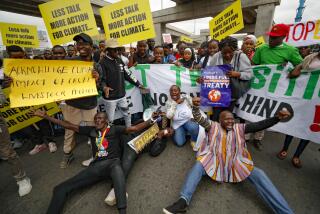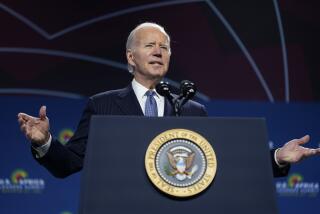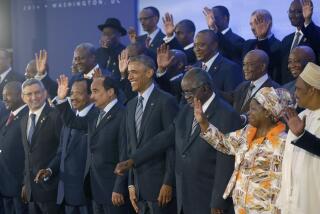Kadafi, Seeking Mandela’s Mantle, Pushes Plan for an African Union
- Share via
SURT, Libya — With acts of largess, grand visions and nitty-gritty politicking, Libyan leader Moammar Kadafi is working hard to position himself as the new moral voice of Africa after the retirement of South Africa’s Nelson Mandela.
Of course, it doesn’t hurt to be the richest player on an impoverished continent.
This week, the flamboyant and much-vilified Libyan leader--celebrating his 30th anniversary in power and the recent suspension of a U.N. air embargo on his country--managed to draw 43 African heads of state and government to his hometown in the Libyan desert. The extraordinary plenum of the Organization of African States was believed to be the largest-ever gathering of African leaders.
Saying they had been inspired by Kadafi’s call for a “strong and united Africa,” the leaders pledged themselves Thursday to establishing a new political and economic bloc on the world stage, the African Union, by 2001.
A Generous Host, a Grand Setting
Helping ensure the leaders’ presence, Kadafi picked up the travel expenses for them and their entourages. Using Libya’s ample oil wealth, he built villas for them and erected what his publicity workers describe as the largest conference hall in North Africa, a glass-and-marble palace festooned with slogans celebrating Africa’s riches.
Plied with mango juice and sweet Arabic coffee and tea, and entertained by musical performances under the nighttime desert sky, the leaders have enjoyed a convivial gathering with no pressing business other than to endorse Kadafi’s unity plan.
What does it say about the state of African public life that so many leaders from the continent have attended the summit here in Surt, a desert town 250 miles southeast of the capital, Tripoli?
Perhaps part of Kadafi’s appeal is that in a world largely neglectful of the continent (except at those moments when a political crisis or humanitarian disaster is in full-fledged eruption), he espouses a view of Africa as a power in its own right, a full and equal partner with Europe, Asia and the Americas in determining world affairs.
Speaking at the opening of the summit Wednesday night, Kadafi reiterated his call for a union of African countries, with its own parliament, courts and executive branch and an armed force that could be used to enforce lawfulness and end the many internal wars that have racked the continent.
He said Western countries that have “insulted Africa and treated Africans as slaves should offer an official apology for all the human and material losses that they inflicted.”
The leaders said they would leave the details of their African Union to legal experts but said it would be modeled on the European Union. They also set a goal of convening a Pan-African parliament by the end of next year.
Kadafi’s vision of unity for Africa “is going to be difficult, but it is a must,” said Kenneth D. Kaunda, the former president of Zambia and one of the first post-colonial leaders of Africa.
“This man is an independent thinker,” Liberian President Charles Taylor said.
Although condemned in the West for his support of terrorism, Kadafi has achieved a level of respect within Africa in part because he has the means to be generous: Libya, a vast desert with only 5 million people, has oil reserves topping 1 billion barrels.
For example, during the conference, Kadafi announced that he will provide $200 million over the next eight years to provide scholarships for 2,500 young Africans.
“This is an unprecedented gesture in inter-African relations. I consider that this is the most beautiful investment made since the OAU was created,” said Algerian President Abdelaziz Bouteflika, the OAU’s current chairman.
In addition, Kadafi offered to pay the $4.5 million in arrears of several smaller OAU member states so that those countries won’t lose their voting rights in the organization. And he said he’s willing to put Libya’s armed forces at the disposal of the OAU.
The OAU was created in 1963 in the first flush of the continent’s independence, but its record has been disappointing. Debt-ridden and ineffectual for much of its history, the group counts as its most significant achievement maintaining a unified front against apartheid in South Africa.
When apartheid ended and Mandela assumed the helm of South Africa in 1994, the former prisoner-turned-president was such a powerful symbol of progress that he was instantly acknowledged as the moral leader of the continent.
With Mandela now gracefully retired, Kadafi appears to sense a void that he can fill. An official newspaper published for the conference prominently quoted Mandela as saying that “the African continent is looking for a leader like Kadafi to forge its unity.”
Serious Discussion on Continent’s Future
Egyptian Foreign Minister Amr Moussa, during a break in the conference, said Kadafi’s call for a United States of Africa had indeed provoked brainstorming among the leaders and “very deep discussion” about the way that Africa should propel itself forward.
But he said Kadafi should not be seen as Africa’s new champion but rather a champion of African integration.
Kadafi is obviously grateful to African leaders for their support of his efforts to get out from under a U.N.-imposed air embargo on Libya meant to force him to extradite to the United States or Britain two Libyan suspects wanted in the 1988 bombing of Pan Am Flight 103 over Scotland.
The 1992 ban on flights was suspended by the Security Council in April after Kadafi, in a compromise, turned over the pair on condition that they be tried in the Netherlands under Scottish law.
Of course, long before he was an advocate of African unity, Kadafi was pushing for Arab unity. At various times he has tried to merge Libya with Egypt, Sudan, Tunisia, Algeria and Syria, and in 1984 he actually signed a treaty of union with Morocco, later abrogated by Rabat.
Although he failed to achieve unity with those Arab neighbors, Kadafi apparently is hoping to obtain a grander goal--the unification of Africa itself.
More to Read
Sign up for Essential California
The most important California stories and recommendations in your inbox every morning.
You may occasionally receive promotional content from the Los Angeles Times.









